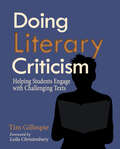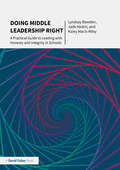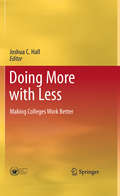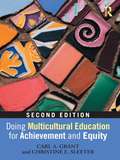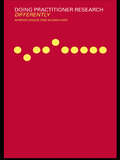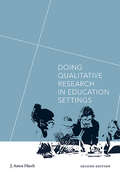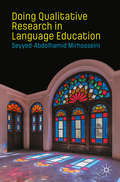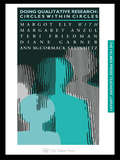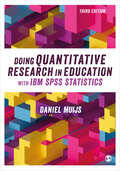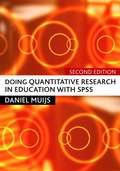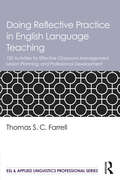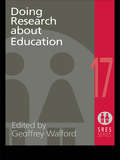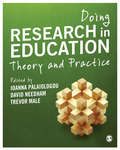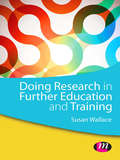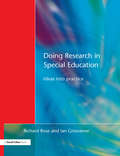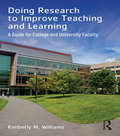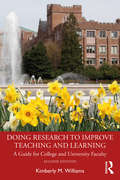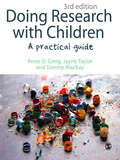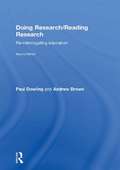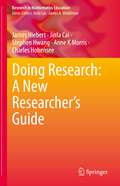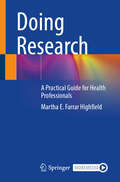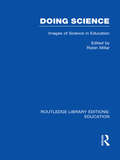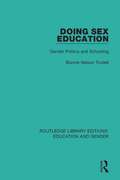- Table View
- List View
Doing Literary Criticism: The Cultivation of Thinkers in the Classroom
by Tim GillespieOne of the greatest challenges for English language arts teachers today is the call to engage students in more complex texts. Tim Gillespie, who has taught in public schools for almost four decades, has found the lenses of literary criticism a powerful tool for helping students tackle challenging literary texts. Tim breaks down the dense language of critical theory into clear, lively, and thorough explanations of many schools of critical thought---reader response, biographical, historical, psychological, archetypal, genre based, moral, philosophical, feminist, political, formalist, and postmodern.Doing Literary Criticism gives each theory its own chapter with a brief, teacher-friendly overview and a history of the approach, along with an in-depth discussion of its benefits and limitations. Each chapter also includes ideas for classroom practices and activities. Using stories from his own English classes—from alternative programs to advance placement and everything in between—Tim provides a wealth of specific classroom-tested suggestions for discussion, essay and research paper topics, recommended texts, exam questions, and more.The accompanying CD offers abbreviated overviews of each theory (designed to be used as classroom handouts, examples of student work, collections of quotes to stimulate discussion and writing, an extended history of women writers, and much more.Ultimately, Doing Literary Criticism offers teachers a rich set of materials and tools to help their students become more confident and able readers, writers, and critical thinkers.
Doing Middle Leadership Right: A Practical Guide to Leading with Honesty and Integrity in Schools
by Kaley Macis-Riley Lyndsay Bawden Jade HickinAre you a new or aspiring middle leader? Or have you been doing the job for a while but want some practical tips to ease workload and support your staff? This book draws together real experiences of middle leadership, both good and bad, and offers practical tips to help you find your voice, support your team, act with integrity and work with the Senior Leadership Team to improve your school. Covering all aspects of middle leadership including leadership styles, pedagogical approaches, the role of social media, how to tackle difficult conversations, staff wellbeing and much more, the authors will help you avoid common pitfalls, navigate highs and lows, and develop a school environment that enables both students and staff to flourish. For any new, experienced or prospective middle-leader Doing Middle Leadership Right provides a professional insight into how to lead with humanity at the centre of your practice. It puts staff and their wellbeing first – focussing not only on how to have the highest standards for both students and staff but also how to lead ethically.
Doing More with Less
by Joshua C. HallThis volume contains a collection of papers by economists which examine the various strategies for cutting costs and improving productivity in higher education in the United States. The dramatic increase in the cost of attending most colleges and universities in recent years has led to increasing concerns regarding college affordability. In addition, with nearly 35 percent of full-time college students failing to receive a bachelor's degree within six years of enrolling in an institution of higher education, the productivity of colleges and universities has also been called into question. Systematic reform of higher education has intensified as a result of the large amount of public and private dollars flowing into it. The chapters in this volume, while recognizing it may be the primary source of the problem, also understand that the political forces behind the subsidization of higher education are unlikely to wane. The contributors examine several areas of possible reform from an economic perspective, including financial aid systems, athletics, and the organization of universities and university systems with an emphasis on identifying the types of reforms that are most likely to result in improvements as well as those that may make things worse. This volume will be of interest to economists, education researchers and policymakers concerned with education reform.
Doing Multicultural Education for Achievement and Equity
by Carl A. Grant Christine E. SleeterDoing Multicultural Education for Achievement and Equity, a hands-on, reader-friendly multicultural education textbook, actively engages education students in critical reflection and self-examination as they prepare to teach in increasingly diverse classrooms. In this engaging text, Carl A. Grant and Christine E. Sleeter, two of the most eminent scholars of multicultural teacher education, help pre-service teachers develop the tools they will need to learn about their students and their students’ communities and contexts, about themselves, and about the social relations in which schools are embedded. Doing Multicultural Education for Achievement and Equity challenges readers to take a truly active and ongoing role in promoting equity within education and helps to guide them in becoming highly qualified and fantastic teachers. Features and updates to this much-anticipated second edition include: Reflection boxes that encourage students to actively engage with the text and concepts, along with downloadable templates available on Routledge.com "Putting It into Practice" activities that offer concrete suggestions for really "doing" multicultural work in the classroom Fictional vignettes that illustrate the real issues teacher education students face and the ways their own cultural attitudes can impact their response New coverage of issues pertaining to student achievement, federal and state policy, and socioeconomic connections between the current economy and educational funding A more comprehensive discussion about the different social movements that have affected education in the past and present
Doing Practitioner Research Differently
by Susan Hart Marion DaddsDoing Practitioner Research Differently encourages those embarking on practitioner research to consider the validity of innovative methods and styles of reporting. The book looks at three methods of enquiry and reporting - visualisation, conversation and fictional writing.Using practitioners' own accounts and research reports as case studies, this book explores the reasons why some practitioners reject the traditional research methods. It looks at the challenges faced by these practitioners and the conditions in higher education that encourage or inhibit innovative practitioner research. The case studies used illustrate that there are modes of enquiry and reporting that can foster the development of professional thinking and practice.
Doing Qualitative Research in Education Settings, Second Edition
by J. Amos HatchDoing Qualitative Research in Education Settings, Second Edition is a methods book that speaks directly to qualitative researchers in the field of education, providing a step-by-step guide to the development of a research project. Written in accessible language, the book emphasizes learning how to do qualitative work. Specific examples from real studies, using real data and demonstrating real analyses, are provided throughout. The book is designed to guide doctoral candidates through the dissertation process, from unpacking assumptions and identifying research questions, through project design, data collection and analysis, to writing the final draft. Recommendations for publishing qualitative work are included.New to the second edition are a comprehensive updating of citations and references, new sections addressing the impact of computer-mediated communication (especially as related to data collection and analysis), an overview of the recent history of qualitative research, and an overall refresh that acknowledges the many changes that have occurred in society and academe since the original publication.
Doing Qualitative Research in Language Education
by Seyyed-Abdolhamid MirhosseiniThis textbook provides a hands-on introduction for students embarking on their first qualitative research projects in language teaching and learning environments. The author addresses theoretical, methodological, and procedural aspects of conducting qualitative studies on issues of language teaching and learning, and includes examples which take a closer look at real-world scenarios and obstacles that might occur in language education research. Written in learner-friendly language, this textbook provides a rare how-to text for beginner qualitative researchers, and will be a valuable resource for upper undergraduate and postgraduate students on courses in applied linguistics, second/foreign language teaching, TESOL, literacy studies and related fields.
Doing Qualitative Research: Circles Within Circles
by Margaret Anzul Margot Ely Teri Freidman Diane Garner Ann McCormack-SteinmetzThis is designed for those learning qualitative research and those more advanced in the field. It focuses on understanding both the cognitive processes of qualitative research and the affective "feel" engendered.
Doing Quantitative Research in Education with IBM SPSS Statistics
by Daniel MuijsThis essential guide for education students and researchers explains how to use quantitative methods for analysing educational data using IBM SPSS Statistics. By using datasets from real-life educational research, it demonstrates key statistical techniques that you will need to know, explaining how each procedure can by run on IBM SPSS Statistics. Datasets discussed in the book are downloadable, allowing you to hone your skills as you read. In this third edition, explanations have been updated with figures and screenshots from SPSS version 28, alongside a range of new research examples and updated further reading. Daniel Muijs is Dean of the Faculty of Education and Society at Academica University of Applied Sciences in Amsterdam.
Doing Quantitative Research in Education with IBM SPSS Statistics
by Daniel MuijsThis essential guide for education students and researchers explains how to use quantitative methods for analysing educational data using IBM SPSS Statistics. By using datasets from real-life educational research, it demonstrates key statistical techniques that you will need to know, explaining how each procedure can by run on IBM SPSS Statistics. Datasets discussed in the book are downloadable, allowing you to hone your skills as you read. In this third edition, explanations have been updated with figures and screenshots from SPSS version 28, alongside a range of new research examples and updated further reading. Daniel Muijs is Dean of the Faculty of Education and Society at Academica University of Applied Sciences in Amsterdam.
Doing Quantitative Research in Education with SPSS
by Daniel MuijsMuijs (education, U. of Southampton, Britain) offers a non-mathematical introduction to quantitative research methods in education, beginning with conceptual issues and designing quantitative research studies and progressing to data analysis using the propitiatory software package PASW Statistics/IBM SPSS. His topics include experimental and quasi-experimental research, univariate statistics, bivariate analysis comparing two groups, multivariate analysis using regression models to look at the relationship between several predictors and one dependent variable, and using analysis of variance to compare more than two groups. The first edition was published in 2004 and reprinted three times. Annotation ©2011 Book News, Inc. , Portland, OR (booknews. com)
Doing Reflective Practice in English Language Teaching: 120 Activities for Effective Classroom Management, Lesson Planning, and Professional Development (ESL & Applied Linguistics Professional Series)
by Thomas S. FarrellThis practical and engaging book introduces readers to reflective practice in English language teaching. Assuming no background knowledge, Thomas S. C. Farrell clearly and accessibly walks through ways that teachers can integrate and implement reflective practice in the classroom and in other contexts to benefit their teaching and their own professional development. Each chapter covers an important dimension of reflective practice and features many ready-to-use activities that are designed to empower teachers and allow them to overcome challenges they’ll face throughout their careers. Covering many types of reflection and the many purposes it serves, this book addresses written reflection, lesson planning, classroom observation, classroom management, group communication and more. This resource is ideal for preservice and early career language teachers and is an important supplement to courses in language education and applied linguistics programs.
Doing Research About Education (Social Research And Educational Studies #Vol. 17)
by Geoffrey WalfordThis book brings together semi-autobiographical accounts from major educationalists about their influential research, focusing on the practical and personal aspects of the research process.The collection reflects the great changes that have occured within educational research since the 1980s and deals with the issues and situations of the late 1990s. It includes accounts that cover the various stages of the research process, a sampling of topics, the diversity of methodologies used in educational research and a range of theoretical perspectives. There is coverage of qualitative and quantitative methodologies and of large and smaller scale research. Also discussed are: ESRC programme research, contract research and theoretical research.
Doing Research in Education: Theory and Practice
by Ioanna Palaiologou Trevor Male David NeedhamThis book will help you to plan, design and conduct quality research within the specific context of education and educational studies. An impressive cast of contributors discuss the reality of conducting research in different educational settings and provide practical advice for both undergraduate and postgraduate students and early career researchers doing research in education. The book discusses key philosophical issues such as understanding research paradigms, ethics and selecting appropriate methodologies but remains grounded in the practical experience of the researcher. It has comprehensive coverage of the whole research process from start to finish, is easy to navigate and helps develop key skills such as: Time management Creating good research questions and hypotheses Constructing the literature review Structuring a project Writing a proposal Managing data Analysing data Writing for specific audiences Packed full of learning features and showcasing a wide range of voices and opinions this book is an ideal guide for anyone conducting research in education or educational studies.
Doing Research in Education: Theory and Practice
by Ioanna Palaiologou Trevor Male David NeedhamThis book will help you to plan, design and conduct quality research within the specific context of education and educational studies. An impressive cast of contributors discuss the reality of conducting research in different educational settings and provide practical advice for both undergraduate and postgraduate students and early career researchers doing research in education. The book discusses key philosophical issues such as understanding research paradigms, ethics and selecting appropriate methodologies but remains grounded in the practical experience of the researcher. It has comprehensive coverage of the whole research process from start to finish, is easy to navigate and helps develop key skills such as: Time management Creating good research questions and hypotheses Constructing the literature review Structuring a project Writing a proposal Managing data Analysing data Writing for specific audiences Packed full of learning features and showcasing a wide range of voices and opinions this book is an ideal guide for anyone conducting research in education or educational studies.
Doing Research in Further Education and Training (Achieving QTLS Series)
by Susan WallaceResearch is an essential component of professional practice. Whether it be action research in a specialist subject or a more formal empirical study, research can improve the quality of teaching and and enhance professional development. This text is a guide to a range of approaches written specifically for teachers and trainee teachers in the Further Education and Skills Sector. The text covers all aspects of research and explores how research through day-to-day investigations can enhance practice. In all chapters, examples and real-life scenarios from the Further Education and Skills Sector are included, helping the reader to link theory and practice. Whether you need to complete a research project for your teaching qualification, or you need to understand how action research can support your professional development, this text will give you the essential, focused guidance you need.
Doing Research in Special Education: Ideas into Practice
by Richard Rose Ian GrosvenorThis book incorporates an international perspective of research related to special education across all phases of education. It draws upon the experience and expertise of recognized researchers and practitioners in special education. As a research handbook for practicing teachers this book provides exemplars of good classroom based research practice addressing a broad range of special needs issues. Methods are presented which can be generalized to situations beyond the case studies immediately presented.
Doing Research to Improve Teaching and Learning: A Guide for College and University Faculty
by Kimberly M. WilliamsGiven the increased accountability at the college and university level, one of the most promising ways for faculty at institutions of higher education to improve their teaching is to capitalize upon their skills as researchers. This book is a step-by-step guide for doing research to inform and improve teaching and learning. With background and instruction about how to engage in these methodologies—including qualitative, quantitative, and mixed methods—Doing Research to Improve Teaching and Learning provides examples across disciplines of how to use one's research skills to improve teaching. This valuable resource equips faculty with the skills to collect and use different types of research evidence to improve teaching and learning in any college and university classroom. Special Features: Chapter openers highlight the questions and issues that will be addressed in each chapter. Recurring text boxes provide authentic examples from actual research studies, student work, and instructor reflections. Coverage of challenges, key successes, and lessons learned from classroom research presents a nuanced and complete understanding of the process.
Doing Research to Improve Teaching and Learning: A Guide for College and University Faculty
by Kimberly M. WilliamsIn this rapidly changing teaching and learning environment, one of the most promising ways for faculty at institutions of higher education to improve their teaching is to capitalize upon their skills as researchers. This book is a step-by-step guide for doing research to inform and improve teaching and learning. With background and instruction about how to engage in these methodologies—including historical analyses, qualitative, quantitative and mixed methods—the second edition of Doing Research to Improve Teaching and Learning discusses a process of working collaboratively and reflectively to improve one’s teaching craft. Full of updated, authentic examples from research studies, student work and instructor reflections, this valuable resource equips faculty with the skills to collect and use data and evidence-based instructional methods in any college and university classroom.
Doing Research with Children: A Practical Guide
by Jayne Taylor Tommy MacKay Anne D GreigThis Third Edition of Doing Research with Children is practical introduction to the process of designing, doing and writing up research with children and young people. At the centre is a commitment to engaging with children and young people as active research participants rather than as passive subjects. In the new edition, you′ll find up to date information on the fast-changing political and ethical debates around research with children and young people as well as guidance on how to carry out research yourself. Divided into three sections, the new edition covers: -the main theories and approaches of research with children and young people -expanded guidance on research ethics -techniques for conducting both qualitative and quantitative research -more on analysing your research -a brand new chapter on communicating your research findings. This is a must-have guide for students and practitioners who are engaging in research with children and young people.
Doing Research/Reading Research: Re-Interrogating Education
by Andrew Brown Paul DowlingThis bestselling text enables beginning researchers to organise and evaluate the research they read, and to plan and implement small scale research projects of their own. It gives structured, practical guidance on: the development of a research question techniques of data collection qualitative and quantitative forms of analysis the writing and dissemination of research. The authors present research as a principled activity that begins with the establishing and structuring of theoretical and empirical fields and research findings as serving to ask questions of educational practice rather than directing it. This revised and updated second edition includes a new chapter dealing with the complex issue of research ethics. It also includes consideration of digital technologies and new media, both as settings of research and research tools, the chapters on qualitative and quantitative analysis have been expanded and the annotated bibliography updated. The authors have been active researchers in educational studies for more than twenty years. They have also supervised numerous doctoral and masters dissertations and taught research methods programmes in various higher education institutions around the world as well as in the Institute of Education, University of London.
Doing Research: A New Researcher’s Guide (Research in Mathematics Education)
by James Hiebert Stephen Hwang Jinfa Cai Charles Hohensee Anne K MorrisThis book is about scientific inquiry. Designed for early and mid-career researchers, it is a practical manual for conducting and communicating high-quality research in (mathematics) education. Based on the authors’ extensive experience as researchers, as mentors, and as members of the editorial team for the Journal for Research in Mathematics Education (JRME), this book directly speaks to researchers and their communities about each phase of the process for conceptualizing, conducting, and communicating high-quality research in (mathematics) education.In the late 2010s, both JRME and Educational Studies in Mathematics celebrated 50 years of publishing high-quality research in mathematics education. Many advances in the field have occurred since the establishment of these journals, and these anniversaries marked a milestone in research in mathematics education. Indeed, fifty years represents a small step for human history but a giant leap for mathematics education. The educational research community in general (and the mathematics education community in particular) has strongly advocated for original research, placing great emphasis on building knowledge and capacity in the field. Because it is an interdisciplinary field, mathematics education has integrated means and methods for scientific inquiry from multiple disciplines. Now that the field is gaining maturity, it is a good time to take a step back and systematically consider how mathematics education researchers can engage in significant, impactful scientific inquiry.
Doing Research: A Practical Guide for Health Professionals
by Martha E. HighfieldThis book provides a step-by-step summary of how to do clinical research. It explains what research is and isn’t, where to begin and end, and the meaning of key terms. A project planning worksheet is included and can be used as readers work their way through the book in developing a research protocol. The purpose of this book is to empower curious clinicians who want data-based answers. Doing Research is a concise, user-friendly guide to conducting research, rather than a comprehensive research text. The book contains 12 main chapters followed by the protocol worksheet. Chapter 1 offers a dozen tips to get started, Chapter 2 defines research, and Chapters 3-9 focus on planning. Chapters 10-12 then guide readers through challenges of conducting a study, getting answers from the data, and disseminating results. Useful key points, tips, and alerts are strewn throughout the book to advise and encourage readers.
Doing Science: Images of Science in Science Education (Routledge Library Editions: Education)
by Robin MillarDoing Science is unique in seeking to make explicit the links between science education and science studies. These fields of study and their respective academic communities, whilst appearing to have many potential points of contact, remain surprisingly separate, with little apparent recognition of the relevance to the interests of each of the work done within the other tradition. Presenting detailed accounts of current research, the book highlights the significance of modern science studies for classroom practice and, conversely, the importance of the classroom and teaching laboratory as a context for science studies. The thread which runs through the collection as a whole is children’s experience of doing science and the image of science which learners pick up along with the science knowledge, understanding and skills they require.
Doing Sex Education: Gender Politics and Schooling (Routledge Library Editions: Education and Gender #15)
by Bonnie TrudellOriginally published in 1993. This book takes the reader inside the contested issue of sex education by examining how a sexuality curriculum is actually taught to a ninth-grade health class and how it impacts on both the teacher and students. Drawing on observations and interviews with teachers, students, and other school personnel to capture the complexity and tension of lived classroom culture, this volume illustrates the dynamic, complex, and sometimes contradictory processes by which traditional versions of appropriate sexual behaviour and gender relations are legitimated as well as contested. The book describes in detail the classroom knowledge that is produced by the interactions between gendered, raced and classed students and teacher, the planned curriculum, and the social organisation of the school and community. The book also tackles the broader issues of how sex education should be taught and even whether it should be taught at all.
